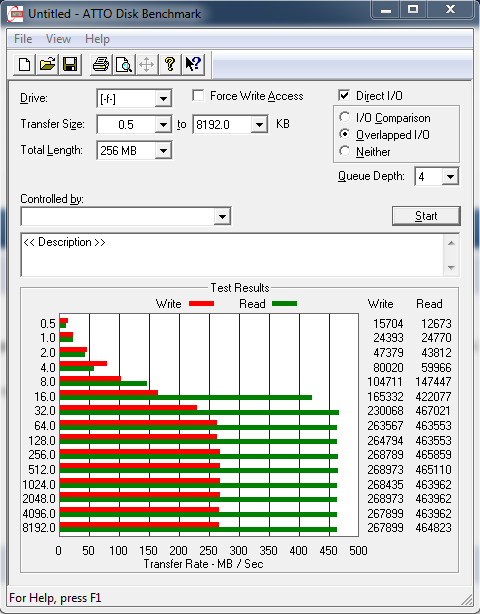ATTO Disk Benchmark is perhaps one of the oldest benchmarks going and is definitely the main staple for manufacturer performance specifications. ATTO uses RAW or compressible data and, for our benchmarks, we use a set length of 256mb and test both the read and write performance of various transfer sizes ranging from 0.5 to 8192kb. Manufacturers prefer this method of testing as it deals with raw (compressible) data rather than random (includes incompressible data) which, although more realistic, results in lower performance results.
Our ATTO results of 467MB/s read and 268MB/s write fell below the advertised specifications of 520MB/s read and 320MB/s write, however, did prove this SSD effective as a SATA 3 product.
CRYSTAL DISK BENCHMARK VER. 3.0 X64
Crystal Disk Benchmark is used to measure read and write performance through sampling of raw (0/1 Fill/compressible) or random data which is, for the most part, incompressible. We are testing with ‘Random’ or highly incompressible data samples for the Bullet proof 3 as this drive does not use compression in storage and test results are very similar regardless of the data sample in use, compressible or incompressible.
Although such would not normally be the case, Crystal Disk Mark has improved our benchmark performance to 481MB/s read and 314MB/s write, the write performance falling in line with specifications for the most part. This is the first opportunity that we had to see the all important low 4k random performance and 43MB/s is not up to par with what we would see in most SSDs these days. This is typical of what we would normally see with the Phison S8 controller.
Up until recently, AS SSD was the only benchmark created specifically for SSD testing and it uses incompressible data. AS SSD, for the most part, gives us the worst case scenario in SSD transfer speeds because of its use of incompressible data and many enthusiasts like to AS SSD for their needs. Transfer speeds are displayed on the left with IOPS results on the right.

 Surprisingly, the access times shown are excellent although the 4k performance has taken its toll on the Point Score with only 383 points, a score we don’t typically rely on.
Surprisingly, the access times shown are excellent although the 4k performance has taken its toll on the Point Score with only 383 points, a score we don’t typically rely on.
On the opposite end of the spectrum, we have some excellent transfer speeds and times as shown in the Copy Bench which can be credited to the Toshiba premium memory used.
 The SSD Review The Worlds Dedicated SSD Education and Review Resource |
The SSD Review The Worlds Dedicated SSD Education and Review Resource | 

why is this so much slower than its SMART drive =/
The SMART is based on the SandForce controller, a premium product, whereas the Phison S8 is meant to answer the question of value vs. performance.
I’ve heard a lot of bad things about SandForce controllers. Is it a thing of the past? Would going with the Phison give me a more stable SSD, if a bit slower?
Any problems rumored by SF controllers are very much a thing of the past and what better proof could thee be from there partnership and validation through Intel, purchase and validation through LSI, partnership with SanDisk and Toshiba and now, last but not least, validation through Mac. SandForce is, and has always been, a top tier SSD and I have run them extensively since day one without a single problem. Phison is a nice SSD and you will see no visible difference unless you have specific transfer tasks in mind.
Okay, I guess it’s still Phison then – but not for the reasons I initially thought. 🙂 Thanks!
Is this going to be updated for the new firmware release?
The drive was returned and is no longer in our possession for this.